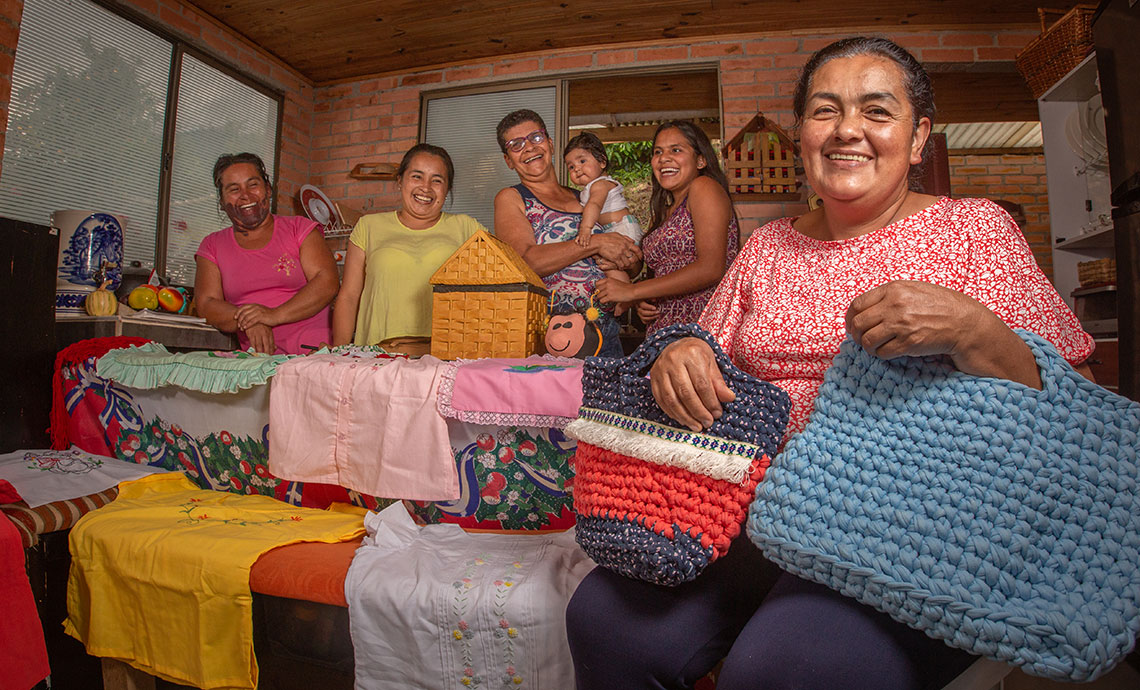
Association of women victims of violence in Herrera, Tolima, where our Energy for Peace (Energía para la Paz) program is implemented.

Association of women victims of violence in Herrera, Tolima, where our Energy for Peace (Energía para la Paz) program is implemented.
One of our priorities is to develop and manage genuine strategic, ongoing and transparent relations with our stakeholders. This allows us to make progress in obtaining and deserving the social license that makes our projects and operations viable, and to promote local, territorial and community development.
We engage in ongoing relations with our various stakeholders in the territories. The knowledge we have on the communities enables us to value their culture and to develop positive actions that respect their ancestral knowledge, views, fears and beliefs, always based on the principles of respect for the integrity of the communities and of human rights.
In 2020, we temporarily suspended our activities at some projects, but maintained direct relations to enable us to return to the territories, by mutual agreement with the local communities and authorities.
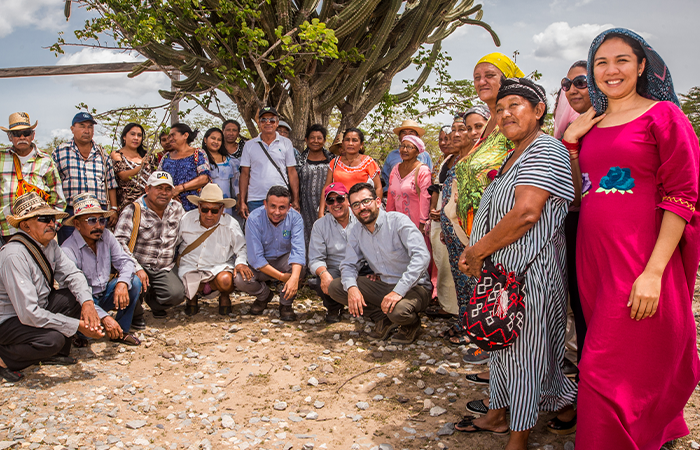
In order to contribute to the well-being of the most vulnerable populations, we implemented a support strategy with humanitarian assistance to families in the area of influence of our projects and operations, to prevent, contain, assist and mitigate the effects caused by COVID-19.
Through our management teams, we provide information and timely assistance to all stakeholders: land owners, municipal and departmental authorities, social organizations, ethnic groups and environmental authorities, among others.
We took into consideration the established protocols to regulate and address several situations that could affect or impact normal performance of the operating centers. This was the case of the relations protocol with the Pijao indigenous community at El Vergel, regarding resuming works and the biosafety protocols. We also held several virtual meetings, with educational presentations that promoted dialogs and to address concerns related to the projects, at a time of changes in many municipal administrations.
We identified strategic partners and synergies for the development of the shared value creation projects, Energy for Peace, and Development Programs with a Territorial Approach (PDET, for the Spanish original).
Based on an internal analysis of our value chain and our environment, we have identified and selected the following stakeholders:
Click on the stakeholder group for additional information






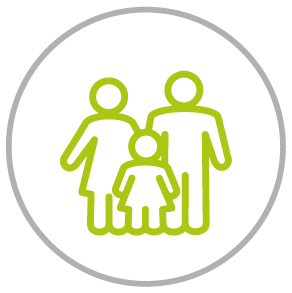
In addition to the various communication channels we have in place with our stakeholders, we defined the following activities to relate with them in diverse socio-political and cultural environments:

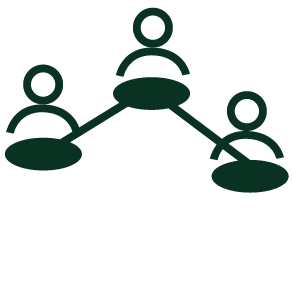

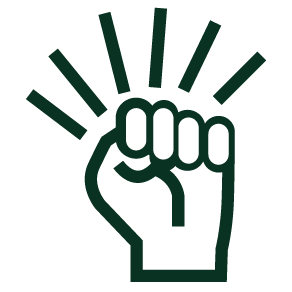

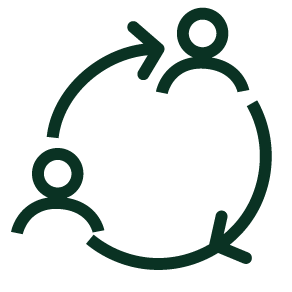


We created greater trust and ensured that the activities in the territories were carried out in a safe manner for our communities, employees and contractors.
We improved relations with the communities in the municipalities that most strongly opposed the energy infrastructure preliminary works, and with the mayors and municipal authorities whose terms in office started in 2020 and will end in 2023.
In Transmission, we developed an indicator to measure the effectiveness of implementation of the social management policies, guidelines and tools. This indicator seeks to ensure that the social management guidelines are implemented in an effective and timely manner in each of the expansion projects. In 2020, we achieved a 97 % fulfillment of the established target for this indicator.
We established a relations protocol for the COVID-19 pandemic health emergency to expand the information and strengthen communications in a simple and timely manner with the communities and local administrations.
We successfully used alternative and innovative communications channels with different stakeholders on various topics, such as the implementation of the biosafety protocols and measures.
We consolidated a region-based structure for the social and shared value team.
We developed and approved the following processes and procedures: HSE Annex, Social Management Plan procedure, resettlement procedure, manual for performance of shared value creation projects, inter-cultural relations manual and relations protocol.
Internally, we positioned the Social and Shared Value Department as a support area that adds depth to our cultural attribute of social awareness.
We were able to satisfactorily manage blockades and stoppages, and made viable the construction of the Refuerzo Suroccidental and Tesalia-Alférez projects en Colombia.
In connection with the COVID-19 health emergency, we made inter-administrative agreements with some municipal administrations to deliver humanitarian aid in municipalities that were prioritized for such assistance.
In the Central region, we carried out 33 meetings for the Sogamoso Project with mayors and their government teams, i.e., 89 % of total municipal authorities; and 34 meetings with municipal ombudsmen (92 %); for the North project, 15 meetings with mayors (79 %) and 11 with ombudsmen (55 %).
In the Western region, we carried out meetings and task groups with municipal authorities of Zarzal, El Cerrito and Palmira (Valle del Cauca, Colombia) to achieve effective participation and ensure the viability of the Refuerzo Suroccidental La Virginia-Alférez Project (500 kV), by defining the layout and clarifying the information to reach agreements.
In the South region, we reactivated and recovered relationships of trust in the municipality of Santa María (Huila) and implemented the Aliados Tríada strategy in the municipality of Planadas (Tolima), which enabled us to strengthen the activities for engagement with the communities and the municipal administration.
In the North region, we held 30 meetings with 253 participants from the communities, local and regional authorities and property owners for the project Membrillal, and 420 face-to-face events, with the required safety measures, to communicate the Colectora Project and carry out prior consultations.
We formalized agreements, in the framework of the prior consultations, with three community councils of Afro-descendant communities and with 30 Wayú indigenous communities, which are highly relevant milestones because they represent significant progress in these inter-cultural dialogs, always protecting the heritage, culture and the decision-making power of these ethnic minorities.
At the La Loma Project (500 kV), we formalized agreements with the community councils Julio César Altamar Muñoz and the Coacneja Community Council, in the framework of prior consultations (also a significant step forward).
We carried out 11 communication events on the protocol for reactivation of the projects for construction, operation and maintenance and the administrative processes for the COVID-19 contingency with the departmental authorities of the AID.
We held 41 meetings at different municipalities to join efforts and coordinate and guide activities in order to assist and mitigate the effects of the health emergency and public calamity caused by COVID-19.
We held 29 meetings with local authorities from 17 municipalities to build consensus and follow up on the social investment initiatives, thereby creating inter-institutional alliances to drive territorial development.
We carried out 90 meetings with mayors, public and private entities and industry associations to generate genuine relations and disclose the benefits of natural gas in Peru.
We held 52 virtual and face-to-face meetings to strengthen genuine relations with the main authorities in the region and to promote the benefits of natural gas.
We held 155 relations activities to create viability in the territories through mutual agreements based on dialogs with civil servants, community leaders and municipal authorities.
At the Colectora Project, we expect to formalize the prior consultation process with the ethnic communities certified by the Ministry of Internal Affairs.
Complete the activities to submit the Environmental Impact Assessment (EIA) of the Colectora Project to the National Environmental License Authority (ANLA, for the Spanish original).
Consolidate the cross-disciplinary teams from the areas involved in the territory (property, environmental, social and technical) to achieve greater impact in the relations with the main actors.
Plan and design dissemination and communication strategies with the communities, ethnic groups and stakeholders.
Carry out consensus-building activities for the shared value and social investment projects, prioritizing the rural districts and identifying the issues in the territories (taking into consideration that the project construction stage will begin soon in the region).
Promote dialogue spaces with the different actors in the territory on the location of the North substation. Once the environmental licenses are final and we begin the construction stage, we will strengthen relations with the property owners to enable the work fronts.
Ensure no balances due certificates in all cases by the contractor with all property owners to start up operation of the Tesalia-Alférez Project.
Implement strategies to reach prior consultation agreements with the ethnic community Parcialidad Indígena living at the Guabas River basin, in the municipality of Ginebra (Valle del Cauca), and any other ethnic communities that may be certified during the EIA process of the Refuerzo Suroccidental La Virginia-Alférez Project (500 kV).
Carry out the EIA of the Refuerzo Suroccidental La Virginia-Alférez Project (500 kV), lead the socio-economic component and implement the second and third stages of participation by means of reaching agreements based on dialogs with the different stakeholders.
Accompany the Ministry of Internal Affairs in the verification of the presence of ethnic communities in the Refuerzo Suroccidental Alférez-San Marcos Project (500 kV), and in the event the need is identified to perform additional prior consultations in this section, carry them out jointly.
Assure social management during completion of the construction process of Tesalia-Alférez, as well as information quality assurance for the close-out of the Mocoa and Tesalia-Alférez projects, to fulfill the requirements to move on to the operation and maintenance phase.
Assure completion of the activities related to the EIA of the Membrillal Project (110 kV), characterization of the area of influence and assessment of impacts and management measures.
Continue the inter-cultural dialogs at the La Loma Project (110 kV) to enable the performance and formalization of the prior consultations, and follow the manual on creation of shared value and social investment with the identified community councils.